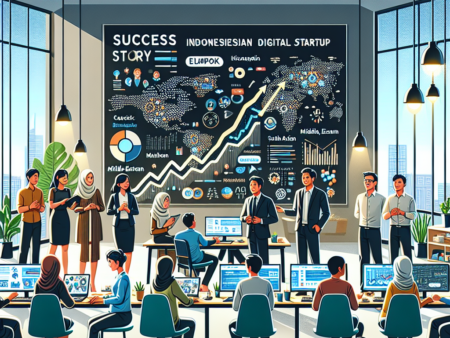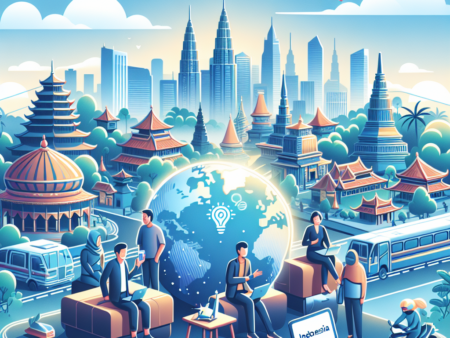Memanfaatkan teknologi dalam Revolusi Industri 4.0, Startup Nusantara bertujuan untuk pertumbuhan yang cepat dan berkelanjutan.
Startup Nusantara dan Revolusi Industri 4.0: Memanfaatkan Teknologi untuk Pertumbuhan
-
Table of Contents
- Introduction
- Understanding Industry 4.0
- The Impact of Industry 4.0 on Indonesian Startups
- 1. Enhanced Efficiency and Productivity
- 2. Access to Global Markets
- 3. Innovation and Disruption
- Opportunities for Indonesian Startups in Industry 4.0
- 1. E-commerce and Digital Marketplaces
- 2. Fintech and Digital Payments
- 3. Smart Manufacturing and IoT
- 4. Agtech and Smart Farming
- Challenges and Solutions
- 1. Lack of Digital Infrastructure
- 2. Skills Gap
- 3. Regulatory Environment
- Conclusion
Introduction

Indonesia, with its vast potential and growing economy, is embracing the Fourth Industrial Revolution, also known as Industry 4.0. This revolution is characterized by the fusion of digital technologies, artificial intelligence, and the internet of things, which are transforming the way businesses operate and creating new opportunities for startups. In this article, we will explore the concept of Industry 4.0 and how Indonesian startups can leverage technology for growth and success.
Understanding Industry 4.0
Industry 4.0 refers to the integration of digital technologies into the manufacturing and industrial sectors. It encompasses various technologies such as automation, robotics, big data analytics, cloud computing, and the internet of things. These technologies enable businesses to optimize their operations, improve efficiency, and create new business models.
The Impact of Industry 4.0 on Indonesian Startups
Indonesian startups have a unique opportunity to leverage Industry 4.0 technologies to drive growth and innovation. Here are some key ways in which Industry 4.0 is impacting Indonesian startups:
1. Enhanced Efficiency and Productivity
Industry 4.0 technologies enable startups to automate their processes, reducing manual labor and increasing efficiency. For example, startups can use robotics and automation to streamline their manufacturing processes, resulting in higher productivity and lower costs. Additionally, the use of big data analytics allows startups to analyze vast amounts of data and make data-driven decisions, further enhancing efficiency.
2. Access to Global Markets
The digital nature of Industry 4.0 allows startups to reach global markets more easily. With the internet and e-commerce platforms, startups can sell their products or services to customers worldwide. This opens up new opportunities for growth and revenue generation, as startups are no longer limited to the local market.
3. Innovation and Disruption
Industry 4.0 encourages startups to innovate and disrupt traditional industries. By leveraging technologies such as artificial intelligence and the internet of things, startups can create new business models and offer unique solutions to existing problems. This not only drives growth for startups but also contributes to the overall development of the Indonesian economy.
Opportunities for Indonesian Startups in Industry 4.0
Indonesia, with its large population and growing middle class, presents numerous opportunities for startups in the era of Industry 4.0. Here are some key areas where Indonesian startups can thrive:
1. E-commerce and Digital Marketplaces
The rise of e-commerce and digital marketplaces has transformed the way Indonesians shop. Startups can capitalize on this trend by creating innovative e-commerce platforms or offering specialized services within existing marketplaces. By leveraging technology, startups can provide a seamless and personalized shopping experience to customers, driving growth in the e-commerce sector.
2. Fintech and Digital Payments
Indonesia has a large unbanked population, presenting a significant opportunity for startups in the fintech and digital payments space. Startups can develop mobile payment solutions, peer-to-peer lending platforms, or digital wallets to cater to the needs of the unbanked population. By providing accessible and convenient financial services, startups can contribute to financial inclusion and drive economic growth.
3. Smart Manufacturing and IoT
Indonesia’s manufacturing sector is a key driver of the economy. Startups can leverage Industry 4.0 technologies such as the internet of things to create smart manufacturing solutions. By connecting machines and devices, startups can optimize production processes, reduce downtime, and improve overall efficiency. This not only benefits the startups but also contributes to the growth of the manufacturing sector.
4. Agtech and Smart Farming
Indonesia is an agrarian country with a large agricultural sector. Startups can utilize Industry 4.0 technologies to develop smart farming solutions, such as precision agriculture and remote monitoring systems. These technologies enable farmers to optimize their crop yields, reduce resource wastage, and improve sustainability. By addressing the challenges faced by the agricultural sector, startups can drive growth and contribute to food security.
Challenges and Solutions
While Industry 4.0 presents immense opportunities for Indonesian startups, there are also challenges that need to be addressed. Here are some key challenges and potential solutions:
1. Lack of Digital Infrastructure
One of the main challenges faced by startups in Indonesia is the lack of robust digital infrastructure, especially in rural areas. To overcome this challenge, the government and private sector need to invest in improving internet connectivity and expanding the reach of digital technologies. This will enable startups to operate effectively and reach a wider customer base.
2. Skills Gap
Industry 4.0 requires a skilled workforce proficient in digital technologies. However, there is a skills gap in Indonesia, with a shortage of professionals trained in areas such as data analytics, artificial intelligence, and robotics. To address this, startups can collaborate with educational institutions to develop training programs and upskill their workforce. Additionally, the government can incentivize the development of digital skills through tax breaks or grants.
3. Regulatory Environment
The regulatory environment in Indonesia needs to be conducive to innovation and entrepreneurship. Startups often face bureaucratic hurdles and complex regulations that hinder their growth. The government should streamline the regulatory processes and create a supportive ecosystem for startups. This can be done through the establishment of regulatory sandboxes and the simplification of licensing procedures.
Conclusion
Indonesian startups have a unique opportunity to leverage Industry 4.0 technologies for growth and success. By embracing automation, big data analytics, and the internet of things, startups can enhance efficiency, access global markets, and drive innovation. However, to fully realize the potential of Industry 4.0, challenges such as the lack of digital infrastructure, skills gap, and regulatory environment need to be addressed. With the right support from the government and private sector, Indonesian startups can thrive in the era of Industry 4.0 and contribute to the country’s economic development.







